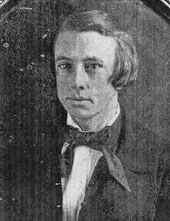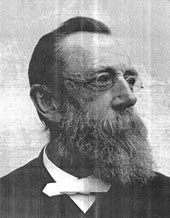 Richard Eddy (June 21, 1828-August 16, 1906), a Universalist minister, wrote an enduringly valuable two-volume history, Universalism in America, 1884-86.
Richard Eddy (June 21, 1828-August 16, 1906), a Universalist minister, wrote an enduringly valuable two-volume history, Universalism in America, 1884-86.
Born and raised in Providence, Rhode Island, Richard was the son of Martha James and shoemaker Richard Eddy. His family belonged to the First Universalist Church in Providence. When he was eight Richard dropped out of school and started working, at first in a tailor shop and later as a chore boy in a bookshop. At sixteen he was apprenticed to a bookbinding firm. During these years he deepened his connection with the Providence Universalist Church. Upon finishing his apprenticeship, he studied under Thomas J. Sawyer at the Universalist-founded Clinton Liberal Institute in Clinton, New York, 1848-50. Sawyer and his author/editor wife Caroline became his lifelong friends.
While studying at Clinton, Eddy met Sarah Stoddard whom he married in 1852. They had five children. After her death he married Lucy P. Friend of Gloucester, Massachusetts.
Ordained in 1852 at Frankfort, New York, Eddy served churches in Rome, New York, 1852-53, and Buffalo, New York, 1854, and Second Universalist Church in Philadelphia, 1855-56. Then in Canton, New York he did supply preaching while furthering his historical research. During the American Civil War he was chaplain of the 60th New York Volunteer Infantry, 1861-63. In 1864 he wrote a history of the regiment.
Eddy served the First Universalist Society in Philadelphia, 1863-68. At the same time he was Librarian of the Historical Society of Pennsylvania, 1865-68. He was minister at Franklin, Massachusetts, 1868-69, and Gloucester, Massachusetts, 1870-77. He did much of the organizational work for the Universalist General Convention’s celebration of the Universalist centennial in Gloucester in 1870. He assembled and edited the official account of the meeting, Universalism in Gloucester, Mass., 1892.
Eddy’s remaining full-time parishes were in Akron, Ohio, 1880-81, and Melrose, Massachusetts, 1881-89. While at the latter church he observed his 50th year as a Universalist preacher. The final years of his ministry were as a supply or interim pastor in such locations as East Providence and Georgiaville, Rhode Island.
Because of his father’s alcoholism Eddy became an advocate of the temperance movement. He was for many years head of the Independent Order of Good Templars. He had delivered over two thousand lectures in favor of temperance and produced two hefty scholarly works-Alcohol in History, an Account of Intemperance in All Ages; Together with a History of the Various Methods Employed for its Removal, 1887, and Alcohol in Society: an Arraignment of the Drink System as an Enemy of the Public Good, 1888-for the New York City-based National Temperance Society and Publication House.
At the very beginning of his parish ministry Eddy started to gather material about the history of American Universalism. As Sawyer noted, the “inquiry and research into our denominational history” was “largely the recreation and business of his life, outside of his professional duties.” As minister in Philadelphia in the 1860s he met once a week with the Rev. Abel C. Thomas to discuss the topic, compare notes, and share knowledge. In 1872 Thomas published his own history, A Century of Universalism in Philadelphia and New-York. While Librarian of the Historical Society of Pennsylvania, 1865-68, Eddy was assisted in his research by ministers and scholars from other denominations.
Between 1874 and 1882 Eddy contributed to the Universalist Quarterly a series of historical essays including “Mrs. Judith Murray,” “Universalist Conventions and Creeds,” and “The Universalist Origin of American Sunday Schools.” He served as editor, 1886-91.
 Universalism in America, Eddy’s major work, covers with care and detailed documentation the history of the Universalist movement from 1636 to 1885. It includes a bibliography of 2,278 American-produced Universalist books, sermons, tracts, essays, and periodicals, published between 1753 and 1886. For each entry he gave several locations of libraries which had copies. Sawyer, in his review in the Universalist Quarterly, wrote, “Here is a volume which our Church should cordially welcome, and of which it may well be proud. Till it appeared we had no history of our faith in this country at once comprehensive and satisfactory.” It was to be another century before another thorough history of Universalism in America was published. Its author, Russell E. Miller, a Congregationalist and chair of the Tufts history department, rated Eddy’s history “a magisterial work, scrupulously accurate, replete with factual and biographical details not readily available elsewhere, and representing a prodigious amount of research extending over more than a quarter of a century.”
Universalism in America, Eddy’s major work, covers with care and detailed documentation the history of the Universalist movement from 1636 to 1885. It includes a bibliography of 2,278 American-produced Universalist books, sermons, tracts, essays, and periodicals, published between 1753 and 1886. For each entry he gave several locations of libraries which had copies. Sawyer, in his review in the Universalist Quarterly, wrote, “Here is a volume which our Church should cordially welcome, and of which it may well be proud. Till it appeared we had no history of our faith in this country at once comprehensive and satisfactory.” It was to be another century before another thorough history of Universalism in America was published. Its author, Russell E. Miller, a Congregationalist and chair of the Tufts history department, rated Eddy’s history “a magisterial work, scrupulously accurate, replete with factual and biographical details not readily available elsewhere, and representing a prodigious amount of research extending over more than a quarter of a century.”
Eddy held many denominational posts and served on numerous committees. He was Standing Clerk of the Universalist General Convention, 1861-67, and from 1887 until his death he edited its annual publication of church and ministerial statistics, The Universalist Register. At the same time, as secretary and president, 1876-1906, he labored on behalf of the Universalist Historical Society (UHS). He helped to establish the UHS library which was housed after 1869 at Tufts College. In 1883 Tufts awarded him an honorary STD.
Eddy died in 1906 as a result of a heart attack while visiting at the Gloucester summer home of his son Benjamin. A funeral service was held the following Sunday at the Independent Christian Church (Universalist) in Gloucester, where both he and John Murray had ministered.
The library of Harvard Divinity School has Eddy’s 163-page autobiography and two of his personal scrapbooks (1824-1906). The latter includes letters, addresses, sermons, newspaper clippings, and photographs. Unfortunately his diary has yet to be located. His works not mentioned above include The Life of Thomas J. Sawyer. . . . and of Caroline M. Sawyer (1900) and, with Joseph Henry Allen, A History of the Unitarians and the Universalists in the United States (1894), and [on Abraham Lincoln] The Martyr to Liberty: three sermons preached in the First Universalist Church, Philadelphia, Sunday, April 16, Wednesday, April 19th, and Thursday, June 1st (1865). For Sawyer’s review of Universalism in America see the Universalist Quarterly (April 1885). Biographical data can be gleaned from David Robinson, The Unitarians and the Universalists (1985); Russell E. Miller, The Larger Hope, vols. 1 and 2 (1979-85). There are obituaries in the New York Times (August 17, 1906), the Universalist Register (1907), the Universalist Leader (1 Sept 1906), and Tufts College Graduate (October 1906). There are short biographical entries in Appleton’s Cyclopedia of American Biography (1900) and Who Was Who in America.
Article by Alan Seaburg
Posted November 11, 2003